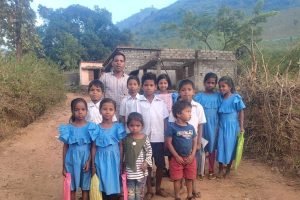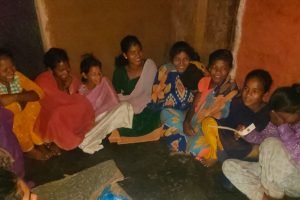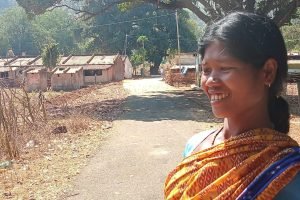It was almost 9 pm on Friday when the ‘Thar (Mahindra) gaadi‘ arrived. It had gone to fetch the young girl in labour from a village- Serkapai about 4 km away. The girl had started experiencing labour pains that morning and had walked the narrow mountain path (not motorable) to reach the swasthya saathi (health friend) in neighbouring Serkapai. The gaadi had left a while ago to pick them up and as it was late, we suspected that she had already delivered.
Right enough, as soon as the gaadi stopped and the men, (SS driver and field animator, Serkapai sarpanch, the girl’s husband and a couple of others we didn’t identify) all jumped out, we heard that she had delivered in the gaadi itself. Happy 3rd birthday Thar gaadi! Here’s your present!
The umbilical cord had not yet been cut so the resident nurse and the women helpers with solar lights in hand jumped into the gaadi. The baby was crying audibly, a sound that for now was music to our ears. It only took a few moments till a helper carried the swaddled boy out to be cleaned and weighed and measured. He looked good, less wrinkled than I imagined a new born to be. The women clambered out one after another- SS staff, swasthya saathi, mum and mum in law of the girl. The new mum came out last, quietly, and sat in the shadow of the gaadi, close to it like it was the familiar home she knew. At some point when the women were done bustling about the child and prepping the room for the mother they came looking for her and took her in.
As we sat outside the now closed doors I suddenly heard the young woman crying. I wondered how she felt in the new environment, surrounded by strange people, equipment and processes. I later learned that she had some blood clots which had not yet been expelled and needed removing. I was consoled by the memory of one of the SS doctors telling me that among these girls pelvic infections were rare and their reproductive health was good. Their menstrual hygiene practices must be good and as far as she knew fidelity was the norm. Still, I prayed under the star sprinkled night sky that along with the swasthya (health) of this small community they remained swaraj (self-governed) even in this procreative and creative field. I hoped the girl had a say in her own and her baby’s health care.
My musings naturally turned to urban hospitals and the attitudes of doctors and patients/ clients there. I was fortunately interrupted on that mostly downward spiraling train of thought by the emergence of the girl’s mother carrying something wrapped in cloth. She took a shovel and opened the gate and stepped out across the road into where the “forest” began. With the solar light she proceeded to dig the earth and bury the placenta. Soon after the sarpanch and the rest of the men left. I too headed to bed realizing that the rest of the stars I had been waiting for that night had descended to earth and were walking around. I had already witnessed them and there was nothing I could offer except gratitude.
Saturday morning as the staff and I headed to the stream to bathe and wash our clothes the family women folk did the same. We then all had breakfast except the young mum. Not knowing why, we tried to ask whether it was because she hadn’t yet bathed or if there was some other custom to be followed. Eventually she sat with a plastic bag of poha and the baby in her arms. I noticed that where the canula (for the saline?) had been there was a simple bandage. The gaadi was readied to drop them back to Serkapai and the didis joked that the baby should be named Tarun Majhi after the Thar gaadi. Remembering it was my last day there and I had no pictures at all of the people and place I’d spent time with, I brought out my phone (camera). Before I could even think to take pictures the mum of the girl said something to me with the word “photo” which I was told was an instruction to take pictures of the young one (rather than them) but of course permission granted, I landed up photographing them all.
As the dust settled behind the family in the gaadi I picked up the discarded canula from the dirt to throw it into the dustbin. As I did this, the nurse didi remarked at how clever and brave the young mum was delivering her own baby, her first. How unlike many others from her community she kept pressure on the spot on her arm. How unlike us city folk who require so much privacy to change an item of clothing, she birthed and adjusted and changed her clothing as discreetly as possible with so many around. I smiled, thinking happily that if this is how the different cultures meet and learn and share with each other then perhaps the true meaning and vision of Swasthya Swaraj lives well and will continue to grow.
The next day – Sunday, I learned, was 4 years to the day that a few brave women from across the country had arrived here with the intention to create Swasthya Swaraj. That this vision is taking shape and inspiring people is a gift to all. Thank you and happy birthday!
Written by Neesha Narorha



